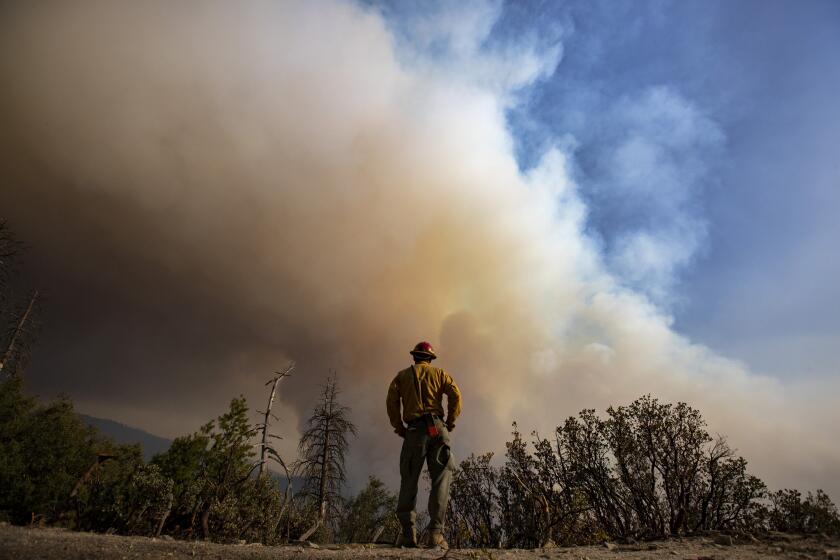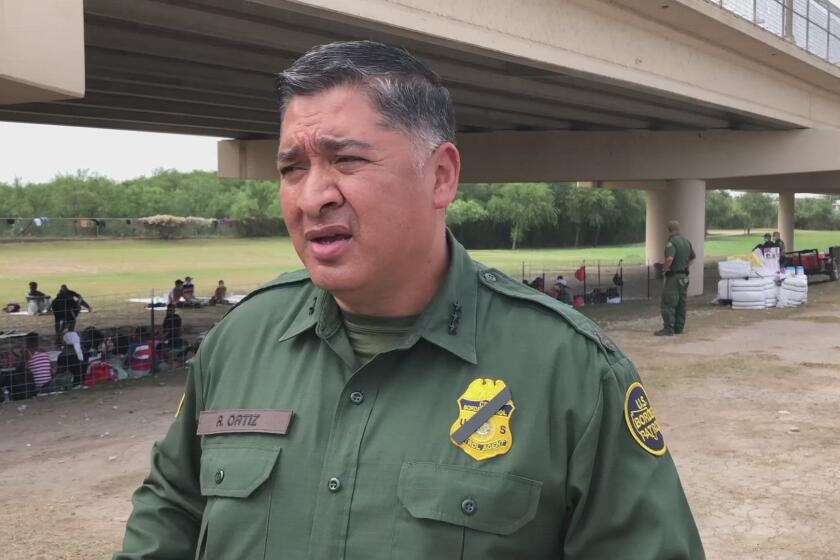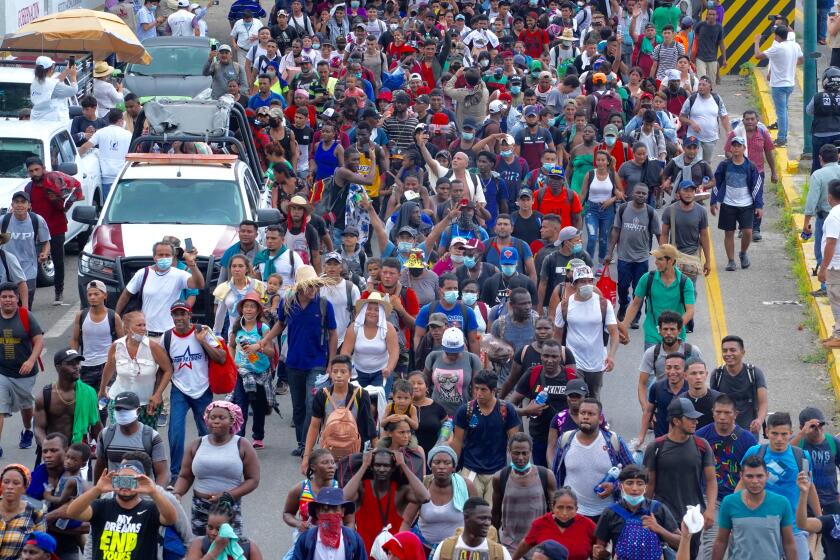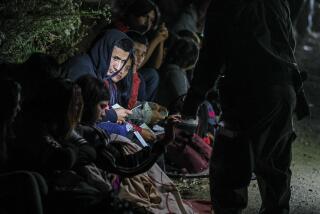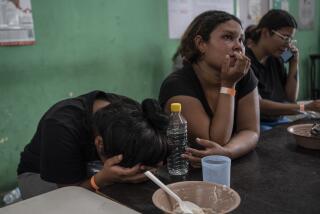U.S. begins removing Haitian migrants, but they continue to flock to Texas border
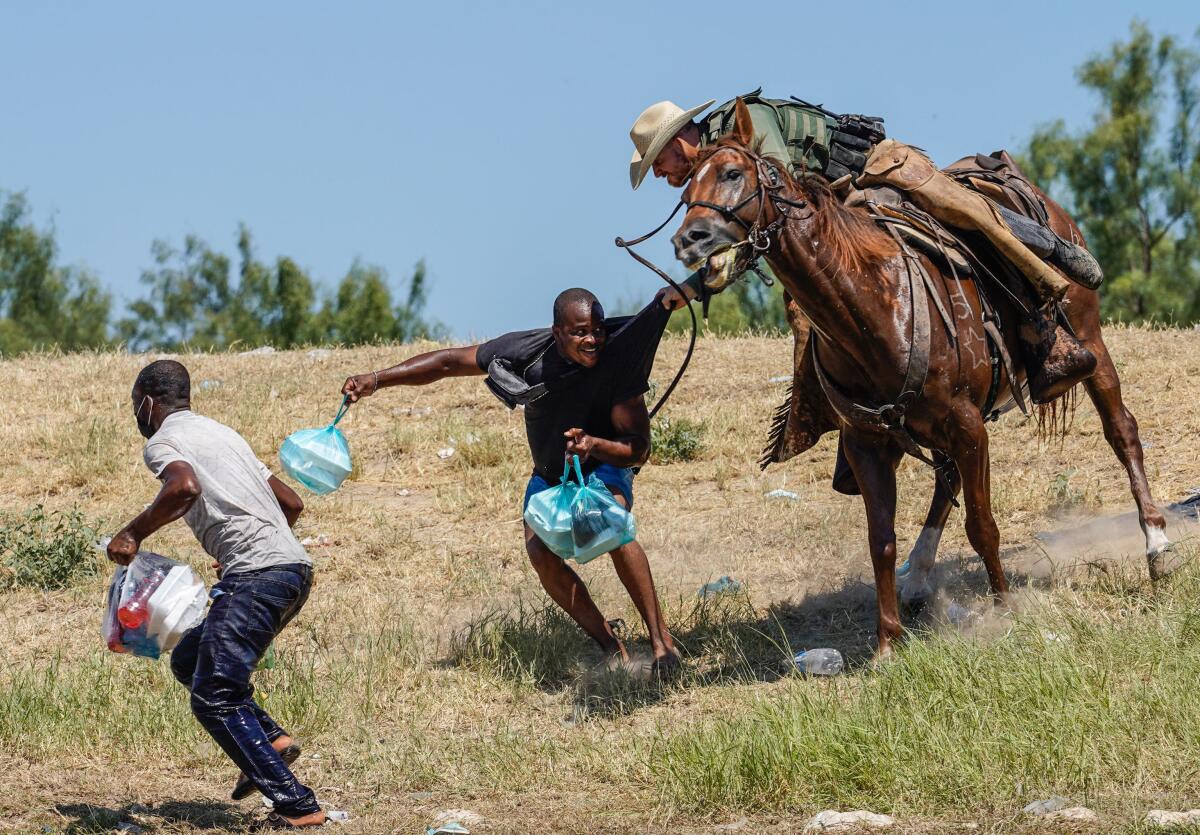
- Share via
DEL RIO, Texas — A week after Haitian migrant Junior Desterville, 30, and his family had made it all the way from Chile to the burgeoning migrant camp here on the U.S. banks of the Rio Grande, the shaggy-haired mechanic set back out to the Mexican side early Sunday to buy food for his hungry wife and 4-year-old daughter, Nayalla.
By noon, Desterville, dressed in a blue T-shirt and black shorts, had waded back north through the chest-high water to return successfully from Ciudad Acuña as Mexican police and Texas state troopers sought to block ongoing river crossings by hundreds of incoming migrants.
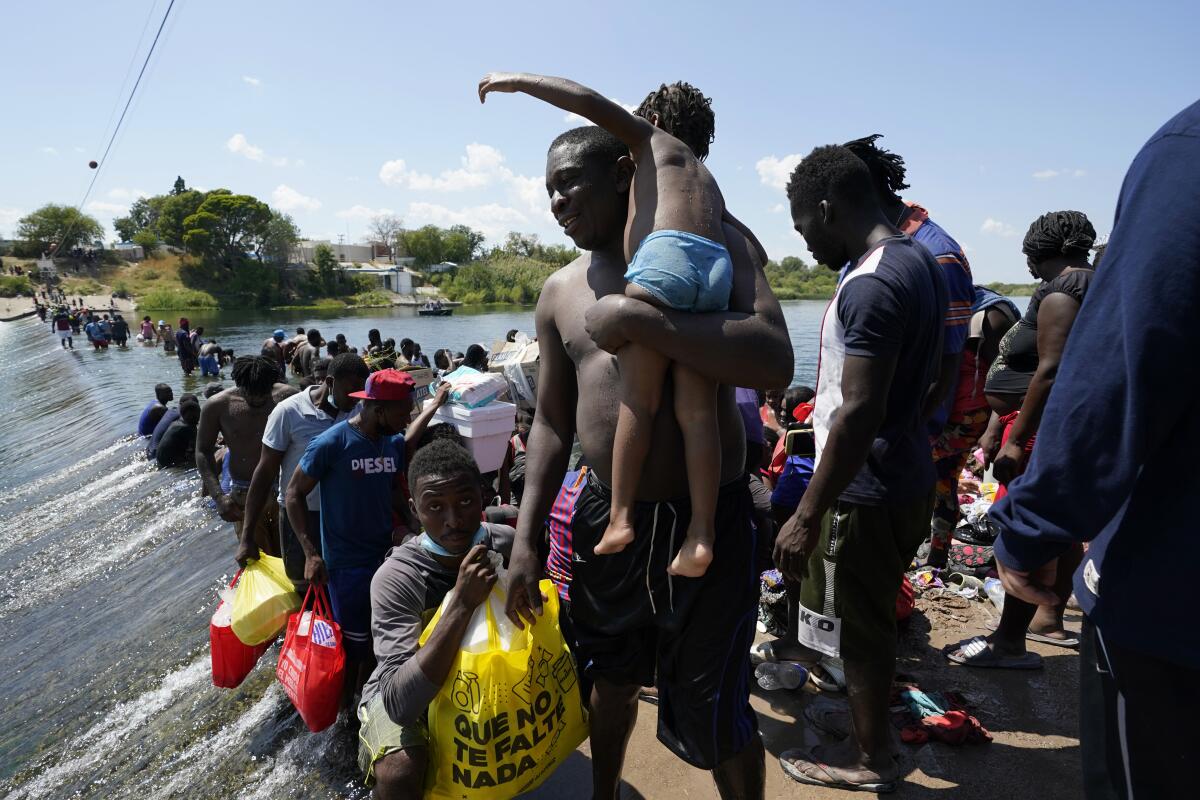
Making his way past a crowd of hundreds and up dirt trails along the riverbank that reeked of human waste, he found his wife, Stephanie, in one of the scores of huts that migrants have built from the carrizo cane lining the waters. They have slept on the dirt inside the hut since making their way to this hot, chaotic camp of an estimated 14,000 migrants after a three-month slog, mainly by bus, through Chile, Central America and Mexico.
Desterville said he can’t imagine returning to Haiti.
“We don’t have a president or security,” he said, referring to the recent assassination of President Jovenel Moïse and devastating earthquake.
“Let us get out of here,” said Stephanie, 24. “We’re hungry.”
Haitian migrants continue to pour into Texas. But hoping to avoid deportation, many decide to cross the Rio Grande back to Mexico.
For many, however, crossing the Rio Grande appears likely to mean a one-way air ticket back to troubled Haiti.
On Sunday, the Biden administration began making good on its promise to send Haitian migrants in Del Rio back to their homeland. The U.S. sent back three flights of migrants taken from the camp. The planes left from San Antonio, and arrived Sunday afternoon in the Haitian capital, Port-au-Prince, each carrying 145 passengers. Homeland Security officials released a statement late Saturday saying that in response to the migrants sheltering in increasingly poor conditions under the Del Rio border bridge, they were was accelerating deportation flights within the next 72 hours.
Critical fire weather conditions are expected to persist through Sunday in Sequoia National Park, where a wildfire reached the Giant Forest.
Families on the first flight held children by the hand or carried them as they exited. Dozens lined up for a meal of rice, beans, chicken and plantains while pondering where they would find housing or jobs. Each was given $100 and tested for COVID-19, though there was no plan to place any in quarantine, said Marie-Lourde Jean-Charles with the Office of National Migration.
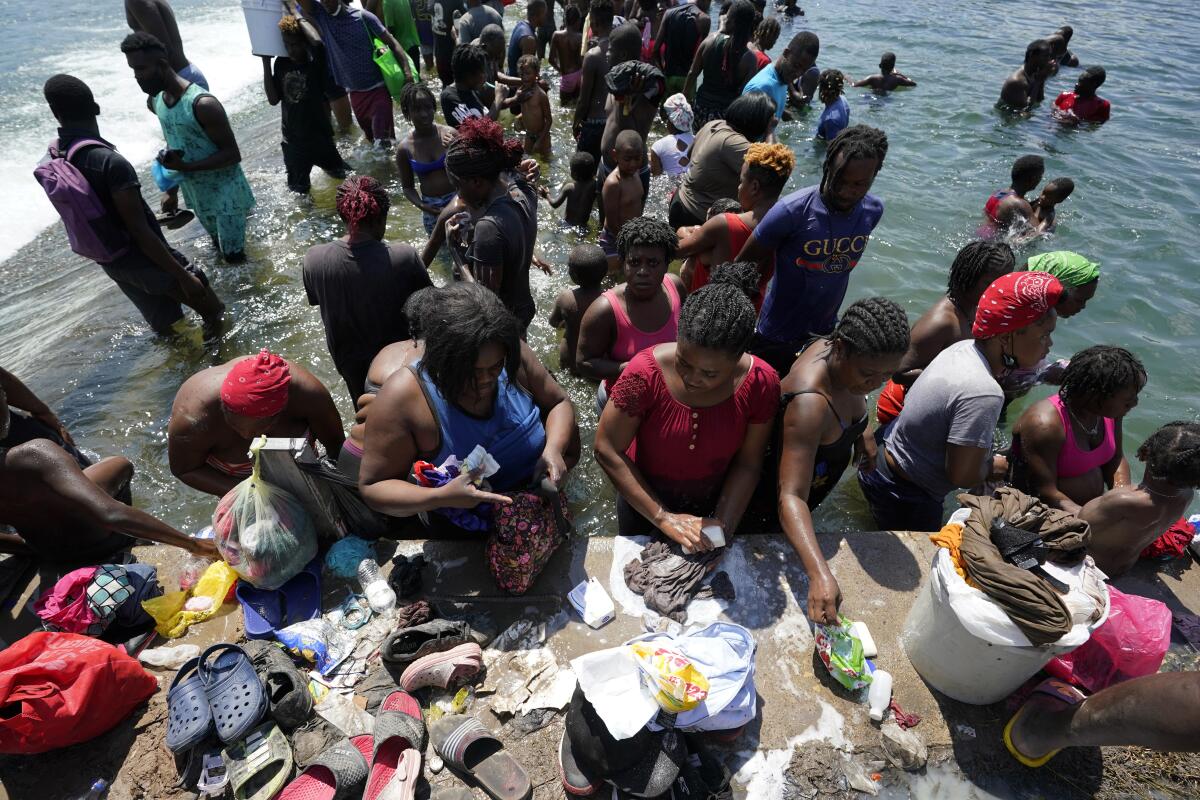
In Del Rio, a large number of buses to transport additional migrants arrived on Sunday for transfer to the flights, or to place them in holding facilities run by the Border Patrol.
Some 3,300 migrants have already been removed from the Del Rio camp to planes or detention centers, Border Patrol Chief Raul L. Ortiz said at a news conference Sunday, and he expected to have 3,000 of approximately 12,600 additional migrants moved within a day. The rest should be gone within the week, he said.
“We are working around the clock to expeditiously move migrants out of the heat, elements and from underneath this bridge to our processing facilities in order to quickly process and remove individuals from the United States consistent with our laws and our policies,” Ortiz said.
Meanwhile, more Haitian migrants appeared to be arriving at the border, undeterred by the U.S. plan.
The influx at the border outpost 145 miles west of San Antonio has come since the U.S. temporarily halted expulsions to Haiti last month following a magnitude 7.2 earthquake, which struck a month after Haiti’s president was assassinated.
Nearly 28,000 Haitians have been intercepted by the Border Patrol for the fiscal year that ends this month, compared with 4,395 last fiscal year and 2,046 the year before. More were in camps in southern Mexico.
The increasing tension has rattled the Del Rio area and conservatives nationwide, who have made it their battleground for border policy just as residents prepare for hunting season, when they fear shootings may erupt.
Del Rio Mayor Bruno “Ralphy” Lozano, a Democrat, declared a local state of emergency on Friday and announced authorities were closing the port of entry. He warned that with more migrants on the way, the camp was expected to reach 20,000. The city of 35,000 has already been the site of an anti-immigrant protest.
Haitian migrants have not pushed north into town, instead moving back and forth across the river to buy food and other supplies in Ciudad Acuña. Late Saturday, U.S. officials attempted to cut off access to Mexico, confining migrants to the camp. But migrant camp inhabitants and new arrivals continued to wade north across the shallows, the newest ones turning themselves in to Border Patrol agents and receiving blue numbered tickets they hoped would allow them to claim asylum.
Desterville, whose number was 11,240, said that the Border Patrol separated migrants when they arrived, removing single people and leaving families to wait at the river.
Several of the camp dwellers were pregnant women, including at least one who gave birth after crossing into the U.S., was taken to the hospital and then returned to the camp.
On Sunday, a woman collapsed within sight of National Guard troops, who slowly approached and carried her away.
Zareal German, 45, who has spent four days at the camp with his wife, who is five months pregnant, said he and other migrants have been denied medical help. Only emergencies were taken to the hospital, he said.
“You see, they don’t care about us,” German said. “Look how we’re living like animals.”
He said he had heard about the deportation flights, but they would not deter him, he said.
“It doesn’t change my mind. I’ve got one thing on my mind: to get to my destination,” he said. He has family in South Florida, he said, where his father recently died, and he came hoping to arrive in time for the funeral on Saturday.
“To get here, we had to cross 10 countries. We had to spend a lot of money. You become broke,” said Alex Bravener, 25, who lived in Chile and Brazil before arriving here with his wife and 3-year-old daughter last week.
“We know that we come here illegally, but we are human too, like the president. We have children,” he said. “If you’re going to deport us, why did you let us in here? If we’re already here, try to do something for us. The world knows we lost our president. We had our earthquakes.
“You deport us, what will we do in Haití? Some of us have been in another country for years. We don’t even know our family there. How are we going to live? We know America can help us to save our children.”
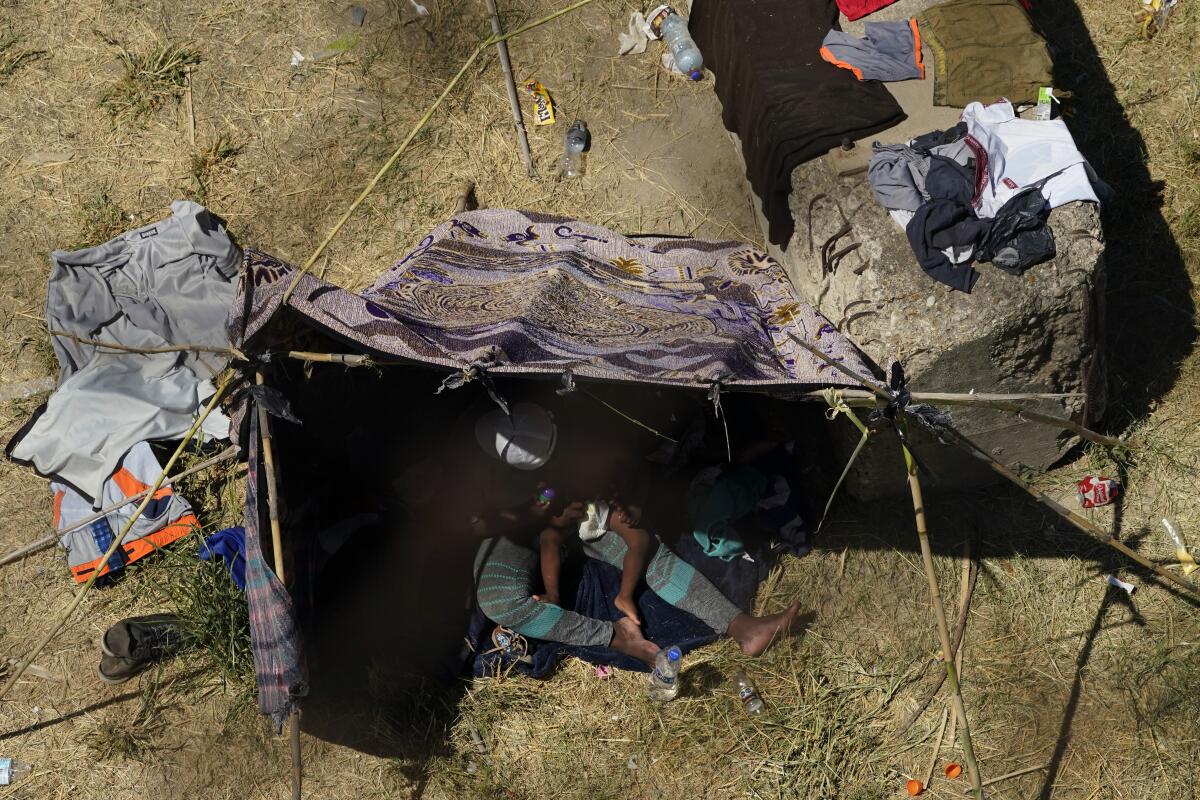
Haitians have been exempted at times from the pandemic policy known as Title 42 that the Biden administration has used to expel migrants back to Mexico without allowing them to claim asylum. Many of the Haitian migrants had gathered in Mexican border cities southeast of Del Rio in recent months after hearing that families with children were not being expelled to Mexico.
There are so many Haitians in Tapachula that the Mexican city can seem like a slice of the Caribbean. Under U.S. pressure, Mexican authorities won’t let them leave.
Homeland Security announced Saturday that it was accelerating the expulsion flights, although it was not clear how many daily flights Haitian authorities had agreed to receive. Federal officials were also trying to return some Haitians to countries they had passed through on their way to Mexico, such as Brazil and Chile.
Republicans have complained of a crisis on the border for months. In August, the Border Patrol stopped migrants nearly 209,000 times, close to a 20-year high. Texas Gov. Greg Abbott has made Del Rio the focus of a campaign to secure the border more tightly, sending scores of state troopers and National Guard troops who have packed local hotels and even pitched a tent camp at the fairgrounds.
On Saturday, Abbott tweeted a photo of state troopers’ cars lining the river, blocking migrants.
“The Texas Department of Public Safety is in full force along the border around the Del Rio area,” he wrote. “They have built a barricade with their squad cars and State Troopers. The National Guard is working with them to secure the border.”
The Del Rio mayor thanked Abbott for the deployment in a video posted late Saturday.
“The governor is trying to provide assistance to help ensure the security of the port and to ensure that we don’t have any major mass movement in case anybody or any individuals begin to just flock the port,” Lozano said.
More to Read
Sign up for Essential California
The most important California stories and recommendations in your inbox every morning.
You may occasionally receive promotional content from the Los Angeles Times.


